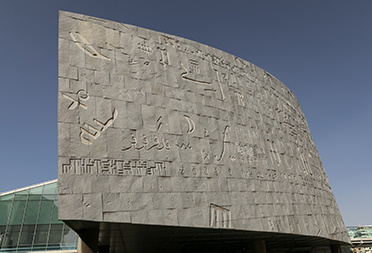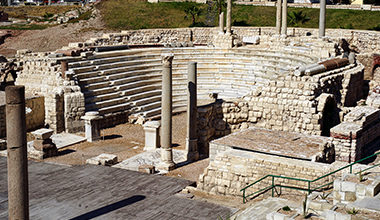
With over 700,000 volumes recorded at its peak, the Library of Alexandria was the most prestigious library in antiquity. It was built according to with the wishes of Ptolemy I, successor to Alexander the Great (founder of the city). Around 290 BC, he decided to endow the Egyptian city with an institution responsible for collecting and preserving all the world’s knowledge on papyrus scrolls.
The library housed documents ranging from scientific treatises to the tragedies of Aeschylus, Sophocles and Euripides, as well as the works of the greatest thinkers and writers of the time, including Homer, Plato, and Socrates. The works were written in all the languages of the known world, from Greek to Egyptian, Hebrew and Aramaic.
The world’s great scientists passed through this centre of learning: the physicist Archimedes, the mathematician Euclid, the father of anatomy Herophilus, the geographer Eratosthenes – who measured the circumference of the earth here – and the astronomer Aristarchus of Samos, who deduced that the earth revolves around the sun. Alexandria soon became the intellectual capital of the Mediterranean.
An uncertain demise: Alexandria’s Legacy
But one mystery surrounds this emblem of learning: its disappearance. No archaeological evidence of the library exists and there’s debate over who caused its end. The Romans, Christians, and Arabs have all been accused of its downfall.
The oldest theory blames Julius Caesar, who, after defeating his rival Pompey, settled in Alexandria. His troops set fire to the Egyptian fleet, and the fire spread to the library which was partially destroyed. The Roman philosopher and playwright Seneca, citing the Roman History of Titus Livius, written between 63BC and 14AD, claims that 40,000 scrolls were destroyed, while the Roman historian Dion Cassius, claims the fire consumed only one storehouse of manuscripts.
The library again suffered fire damage almost three centuries later, when Zenobia, Queen of Palmyra, conquered Alexandria, and Emperor Aurelian sent his armies to recapture the city.
The march of time: the Library of Alexandria across the ages

However, these are not the only theories. An edict issued by Emperor Theodosius I in 391 targeted temples and pagan writings and called for the destruction of the remaining part of the library.
Other sources claim that the library was wiped out when Alexandria was taken in the 7th century. Caliph Omar and General Amr ibn al-Ass are said to have ordered the burning of all secular books for use as firewood in the public baths. This version has no basis in fact, according to many experts.
A final hypothesis is that the library suffered as a result of the various invasions and that the scholars and intellectuals fled over time. It would have gradually disappeared and the documents, all written on brittle and fragile papyrus, would have been destroyed over time.
The story of the disappearance of this treasured universal library continues to inspire dreams and fuel controversy.
Want to ensure the safety and management of your records? Contact one of our expert archivists.







